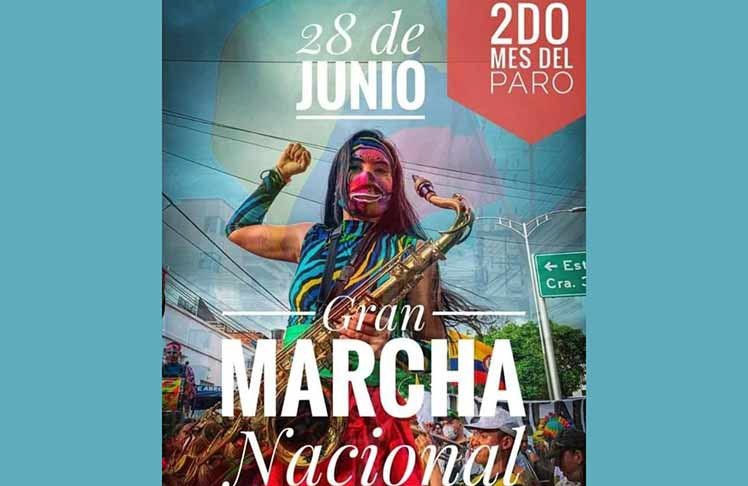
Colombians take to the streets again
Bogota, June 28 (RHC)-- Colombians are taking to the streets again, two months into the national strike against the government of Ivan Duque. Protests are demanding justice for the more than 70 killed, hundreds disappeared, thousands injured and dozens of eye injuries at the hands of the police and the Mobile Anti-Riot Squad (ESMAD).
On April 28, a national strike began against a tax reform bill that would have increased taxes on goods and services and created new taxes. Although a few days later the Duque government withdrew the proposal, the strike continued and resulted in a social outburst considered the largest in the last 70 years.
Over these two months, violence by security forces and civilians supported by the police left more than 80 people injured, hundreds disappeared, 81 people injured in their eyes, tortured, among other repressive actions, according to human rights organizations.
Despite these figures provided by groups such as Temblores ONG, the Institute of Studies for Development and Peace, the participants in the strike assure that they obtained several results.
They emphasize that they were able to stop the tax reform, the health reform, the resignation of the Minister of Finance Alberto Carrasquilla, the Foreign Minister Claudia Blum and the commander of the Cali Police, Juan Carlos Rodriguez.
It prevented the purchase of 24 warplanes for a huge sum of money and put an end to the daily speeches of the program Prevention and Action, in which the president of the country, Iván Duque, appeared every day to address issues related to COVID-19.
The daily mobilizations achieved free tuition for the second semester of this year for public higher education students from the lowest strata.
The strike managed to position the need for a structural reform in the National Police, to make the youth, the First Line and the Indigenous Minga visible as revolutionary actors.
It also made it possible to promote citizen participation (assemblies and open town councils); to make visible to the world the political and social crisis that Colombia is experiencing with the Duque government, to prioritize life and peace over soccer, since the celebration of the America Cup was prevented here.
The mobilizations also succeeded in redefining the country's historical memory and that a large part of Colombia declared its opposition to the doctrines promoted by former president Álvaro Uribe, founder of the ruling Democratic Center party.
Finally, it made it possible to bring to light the massive and systematic violation of human rights by the security forces and the demand to dismantle the ESMAD.

